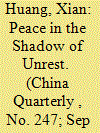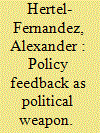| Srl | Item |
| 1 |
ID:
181138


|
|
|
|
|
| Summary/Abstract |
Much research on contentious politics focuses on the origins and dynamics of contention or the impact of contention on policy change. Although some studies have delved into the state reactions to contention, relatively little is known about the outcome or effectiveness of state responses, especially in non-democratic settings. This paper attempts to fill this gap and to uncover the policy feedback effect in non-democratic settings by studying the Chinese state's repression of violent incidents targeted at healthcare personnel and facilities (yinao). I argue that without comprehensive healthcare reforms to tackle the root causes of yinao, state repression of yinao generates unintended adverse outcomes, causing the doctor–patient relationship to deteriorate. Using the difference-in-differences method with China Family Panel Studies data for 2014 and 2016, I find that the criminalization of yinao diminishes public trust in doctors and confidence in hospitals’ competence and instead increases public concerns about the healthcare system.
|
|
|
|
|
|
|
|
|
|
|
|
|
|
|
|
| 2 |
ID:
159490


|
|
|
|
|
| Summary/Abstract |
Scholars have shown that once in place policies can foster greater political participation. Indeed, politicians often deliberately design policies to shore up political support among their allies. But can political actors engineer the reverse effect, crafting policies that demobilize their rivals? Drawing on the example of conservative cross-state advocacy against public sector unions, I describe the strategy of policy feedback as political weapon, or when actors design policies to politically weaken their opponents. I then document that the passage of conservative network-backed legislation led to large and enduring declines in public sector union density and revenue. I further show that by curbing the power of public unions, the passage of conservative network-backed bills dampened the political participation of public sector employees. My findings emphasize the importance of considering how actors use policy to demobilize political opponents and explain why public unions are now on the defensive in state politics.
|
|
|
|
|
|
|
|
|
|
|
|
|
|
|
|
| 3 |
ID:
122465


|
|
|
|
|
| Publication |
2013.
|
| Summary/Abstract |
The welfare reforms of the Coalition government are marked by the legacy of Thatcherism. Social security reforms in the 1980s reshaped the system towards reliance on means-tested benefits. Negative policy feedback created by the opacity and perverse effects of means-testing has made these benefits an easy target for the Coalition, at least so far as working age people are concerned. Different policy feedbacks affect policy towards old age pensions. The government is locked into promoting private pensions, and is extending this commitment with automatic enrolment. To make private pensions pay, it has to reverse the slide to means-testing. The implication is that the pronounced bias against the working poor and in favour of older people in Coalition policy is not simply a matter of electoral preferences: rather, it reflects the political effects of previous policy decisions.
|
|
|
|
|
|
|
|
|
|
|
|
|
|
|
|